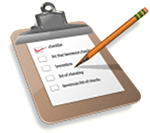 Tools and Resources
Tools and Resources
Many organizations are riding the ES wave by developing and sharing tools and resources that are proving to be extremely helpful when working with the Essential Skills. New materials are always being added to many of these websites, so be sure to bookmark these sites and visit often.
WEB-BASED SELF-ASSESSMENT TOOLS
ES Indicator Tool
 One of the major concerns of literacy practitioners is that the ES levels don’t correspond with the standard LBS levels, making it difficult to determine how ES profiles could be used with adult learners with lower skill levels. The Indicator tool, which can be accessed through the ES Toolkit link (http://www.edsc.gc.ca/eng/jobs/les/tools/index.shtml) was developed to help evaluate ES levels by testing skill strengths in Reading, Document Use, and Numeracy from Levels 1 through 3. The content provides a snapshot of the increasingly diverse and complex applications of ES at each subsequent level.
One of the major concerns of literacy practitioners is that the ES levels don’t correspond with the standard LBS levels, making it difficult to determine how ES profiles could be used with adult learners with lower skill levels. The Indicator tool, which can be accessed through the ES Toolkit link (http://www.edsc.gc.ca/eng/jobs/les/tools/index.shtml) was developed to help evaluate ES levels by testing skill strengths in Reading, Document Use, and Numeracy from Levels 1 through 3. The content provides a snapshot of the increasingly diverse and complex applications of ES at each subsequent level.
Using the Indicator tool, learners answer a varying number of questions and are provided with an immediate summary of their results. There are three pdf evaluations and one on-line version. Literacy practitioners who are getting their feet wet in Essential Skills are encouraged to run through the ES quizzes themselves.
Measure – Up
The How do your skills Measure Up? website (http://measureup.towes.com/) offers a variety of activities and resources to assist students and practitioners in Essential Skills evaluation. It is a product of the TOWES (Test of Workplace Essential Skills) assessment system that was developed by Bow Valley College, Alberta. Unlike TOWES, Measure Up is a non-standardized, informal tool that provides free self-assessment activities. Learners can explore career paths, test skills, and practise their Reading Text, Document Use, and Numeracy skills. Tips for using the Measure Up materials, as well as developing work-related materials are available for practitioners. It is a site worth exploring.
ASSESSMENT TOOLS
CABS
Developed by Literacy Link Eastern Ontario (LLEO), CABS or Common Assessment of Basic Skills is now in its third edition and is an LBS assessment tool that is worth reviewing. An on-line version is accessible at (www.lleo.ca/col/cabs_online.html), providing comprehension assessment information and preview and practice modules. Although originally created for initial intake, CABS demonstrations can be used for on-going or exit assessment purposes. The CABS manual is available for purchase (seewww.lleo.ca/cabs3/index.html) and is divided into five sections representing the five LBS levels.
 LLEO has recently developed Common Assessment of Essential Skills (CAES), an articulation template that will help literacy practitioners tie the LBS outcomes to Essential Skills. Suggestions for administering the demonstrations have been added, increasing the manual’s flexibility of use. CAES will be released in 2008. The print version of CABS is available for purchase.
LLEO has recently developed Common Assessment of Essential Skills (CAES), an articulation template that will help literacy practitioners tie the LBS outcomes to Essential Skills. Suggestions for administering the demonstrations have been added, increasing the manual’s flexibility of use. CAES will be released in 2008. The print version of CABS is available for purchase.
CAMERA
The Communications and Math Employment Readiness Assessment (CAMERA) is an assessment tool that was created by Preparatory Training Programs of Toronto (PTP). A standardized diagnostic tool that draws on authentic workplace documents, CAMERA tests both occupationally specific skills, as well as Essential Skills. CAMERA examines Document Use, Reading Text, Numeracy, and Writing, using tasks at levels that best accommodate the abilities of adult learners who are looking for feedback on their strengths and areas requiring development. The CAMERA assessment model was chosen as the Transition to Employment component for the Learner Skill Attainment (LSA) initiative that is currently in the final stages of development and being reviewed by the Ministry of Training, Colleges, and Universities. The PTP website (www.ptp.ca/) offers some information about this purchased assessment tool.




